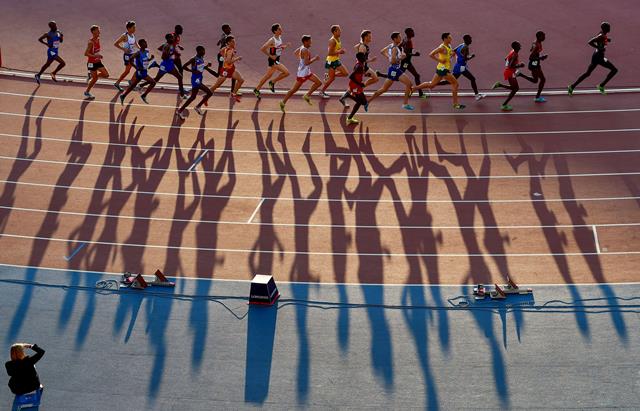 Glasgow Commonwealth Games 2014. Athletics, Hampden Park. Men's 10,000m final. [photo: Ian Rutherford / Alamy]
Glasgow Commonwealth Games 2014. Athletics, Hampden Park. Men's 10,000m final. [photo: Ian Rutherford / Alamy]
[This is an excerpt from an article in The Round Table: The Commonwealth Journal of International Affairs.]
The Commonwealth Games have a long history of bringing together top athletes to celebrate superior prowess. Since the inaugural British Empire Games in Hamilton, Canada, in 1930, and through the renamed British Empire and Commonwealth Games (1954-66), the British Commonwealth Games (1970–74) and today’s Commonwealth Games, this gathering of athletes has operated as a distinctive symbol of the Commonwealth itself, a venue in which athletes perform, perhaps as preparation for the much larger Olympics but more importantly as a key agent of the unity of the Commonwealth. Attended by members of the Royal Family, the Games have long served as a special opportunity for nations to bring forth their best and to do so within a space of friendly but intense competition.
But as we move into the next decades of the 21st century, it is clear that rising costs are leading to an abandonment of commitment to hosting the games. In the past months, the state of Victoria, Australia, and the province of Alberta, Canada, have announced their rejection of earlier commitments to host the 2026 and 2030 games, respectively, primarily due to the costs of staging the games. What are the implications of this reluctance (and financial incapacity) for the Commonwealth – and especially if two of the wealthiest nations in the Commonwealth have chosen recently to abandon their offers?
Victoria drops the Commonwealth Games
Off track: Are the fun and Games over for the Commonwealth?
Glasgow, the referendum and the Commonwealth Games
First, the commercialisation of athletics over the past decades has driven expectations for the Games well beyond what can be hosted by any but the wealthiest members of the Commonwealth. Transitions from amateur to professional athletics over the past fifty years have created pressures on athletes to perform at Olympic levels – or to see the Games as a training ground, a pathway to Olympic and global performance – with consequent pressures on the quality of facilities, support infrastructures and taxpayers’ purses. These pressures have driven the Games well beyond the reach of most members of the Commonwealth. It is striking to note that the United Kingdom, Canada, Australia, and New Zealand account for 88% of Games hosting since 1930.
Second, the Games themselves struggle to define their role within the Commonwealth – partly because of the global commercialisation of athletics but also because the geopolitical dynamics of the modern Commonwealth have shifted considerably from the simple ‘colonial/post-colonial’ dynamics of yesteryear. The time has come to reposition the Commonwealth Games by confronting the geopolitical dynamics of the present day – and to be clear that multilateral politics, economics, and sports are linked inextricably in the future of the Commonwealth. What might this future Games look like?
A New Commonwealth Games would reject explicitly the ‘pre-Olympic’ demands on athletes, venues and state budgets, opting instead to use existing athletic venues and to eschew the ‘single venue/city/country’ model that has dominated the Games to date. A thematic or sport-specific approach must be taken, with competition distributed across Commonwealth members or regional groupings. For example, track and field in London, swimming in Toronto, sailing in Antigua and Barbuda, all happening simultaneously. Current broadcast and online technologies make this possible – and multiple simultaneous locations will generate additional advertising revenues that could sustain the new model and make best use of existing athletics facilities.
Further – and perhaps most importantly – the New Commonwealth Games must continue its collegial partnership, friendly (but intense) athletic competition, and dialogue between members – and move beyond the ‘large wealthy dominion’ model of past years.
Robert Summerby-Murray is President and Vice-Chancellor, Saint Mary’s University, Halifax, Canada.



